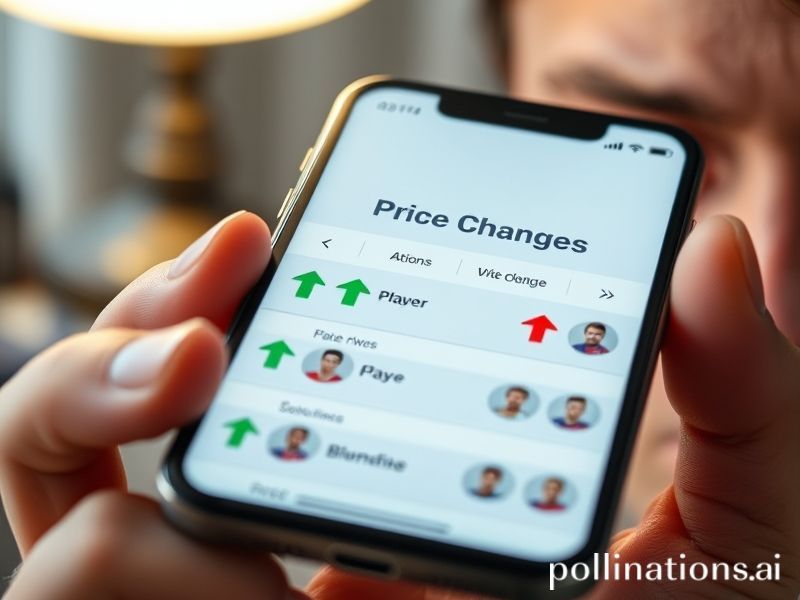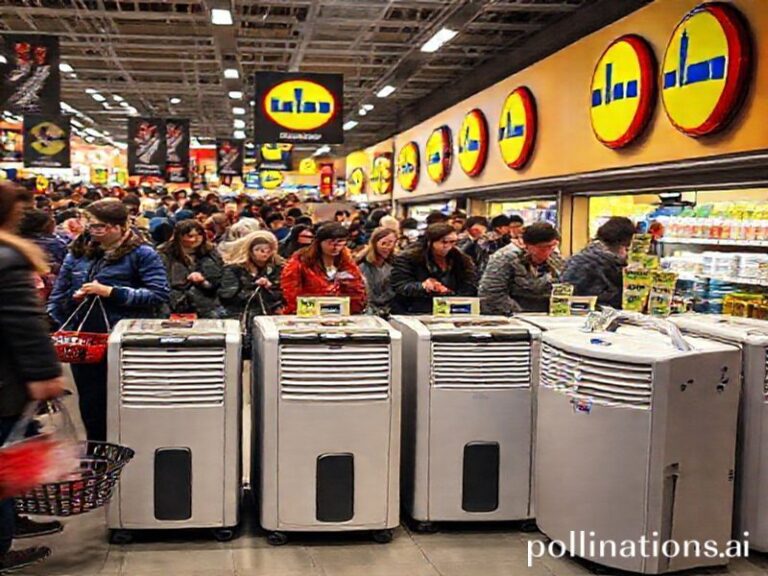Global FPL Price Shockwaves: How a Fantasy Football Tweak in Croydon Can Tank the Peso
FPL Price Changes: The Only Global Market Where a Hamstring Twitch Can Crash the Bolivian Boliviano
Dave’s Locker — International Desk
Geneva, Tuesday, 02:14 a.m. CET — While the Swiss haggle over cocoa futures and Singaporean quants nurse their ulcers over crypto spreads, a quieter, more ruthless market is open 24/7 and speaks every language: Fantasy Premier League price fluctuations. From Lagos laundromats to Reykjavik student dorms, the mere rumor that Erling Haaland sneezed near a Pilates reformer can send his virtual sticker price rocketing faster than a North Korean missile test.
Welcome to football’s shadow bourse, where the collateral damage is not sovereign debt but Dave from Dagenham’s mini-league bragging rights.
The Mechanics of Mass Delusion
FPL price changes operate on elegant, brutal mathematics: net transfers in or out determine whether a player’s cost inflates or deflates like a punctured ego. The threshold is secret, the timing erratic, and the herd behavior indistinguishable from a Black Friday stampede at a suburban Walmart. Analysts in London pubs now speak of “price change windows” the way their grandfathers once muttered about the gold standard.
Consider the recent case of Brighton’s resident Estonian trickster, João Pedro. After two goals and a VAR-assisted existential crisis against Wolves, his ownership leapt from 3 % to 17 % in 36 hours. The algorithm—housed, rumor has it, in a disused BT phone box outside Croydon—nudged his price up £0.2m, instantly pricing out half the managers who were still negotiating their spouses’ consent to take a -4 point hit. Somewhere in São Paulo, a data-science intern for a Serie A club spat out his açaí: the FPL market had moved faster than the actual bookies.
Global Contagion
The ripple effects are planetary. In Manila, jeepney drivers huddle over cracked Android screens at 3 a.m., praying the Wi-Fi from the 7-Eleven holds long enough to beat the price rise. In Nairobi, one telecom reports a 400 % spike in midnight data bundles every Friday—coinciding suspiciously with FPL deadlines and a corresponding drop in birthrates nine months later (study pending).
Meanwhile, European central-bank economists—bored of negative interest rates—have begun tracking FPL price volatility as a proxy for consumer sentiment. Their white paper, leaked last week, noted that a 0.1m rise in Marcus Rashford’s cost correlates with a 0.3 % dip in U.K. retail footfall, presumably because the nation’s emotionally exhausted middle managers are too busy triple-captaining a Spurs defender who once played futsal with Son’s cousin.
Geopolitical Side-Eye
The phenomenon has not gone unnoticed by the usual suspects. Russian disinformation accounts—fresh from meddling in everything from elections to Eurovision—have reportedly seeded fake injury reports on Reddit to trigger mass sales of Arsenal fullbacks. The GRU, it seems, has realized that destabilizing Western morale is easier when the weaponized rumor is that Gabriel Jesus has a “minor calf awareness.”
And then there’s China. With the real Super League reduced to a state-run calisthenics club, Beijing’s censors allow FPL traffic to flow uncensored, presumably concluding that keeping 1.4 billion citizens fixated on imaginary English athletes is cheaper than social services. Tencent even launched a Mandarin-language price-alert bot called “小涨价” (Little Price Hike), which achieved 8 million users before anyone noticed its push notifications were routed through servers in Vladivostok.
Humanity’s Quiet Reckoning
What unites us, ultimately, is the exquisite humiliation of watching your carefully crafted spreadsheet implode because some 19-year-old Bournemouth winger you’d never heard of until Tuesday just scored a 93rd-minute winner and now costs more than your monthly Spotify subscription. It is late-capitalist poetry: no borders, no tariffs, just collective delusion wrapped in green arrows and red regrets.
Conclusion: The Last Honest Market
In a world where stock buybacks masquerade as productivity and carbon credits absolve private jets, FPL price changes remain refreshingly transparent: thousands of tiny human follies, aggregated in real time, telling us exactly how irrational we are prepared to be on any given gameweek. The algorithm doesn’t care about your mortgage, your marriage, or your Marxist critique of commodified sport. It simply asks: in or out?
And when the final whistle blows on civilization, archaeologists will sift through the ashes, find a perfectly preserved screenshot captioned “Wildcard activated,” and nod solemnly: here was a species that chose to hedge against mortality by captaining a Norwegian cyborg against Sheffield United.
God help us all, the price just went up again.







